
How Artificial Intelligence (AI) is Changing the Travel Industry
Artificial intelligence is improving all the time, making it more reliable and more attractive as a business solution. In particular, businesses in the travel industry are taking advantage of AI in order to perform a variety of administrative and customer service tasks. Here, you will learn the uses and benefits of artificial intelligence, and explain how it is changing the way travel companies operate.
Understanding Artificial Intelligence
The concept of artificial intelligence, or AI, is often discussed, but can be slightly more difficult to define. Essentially, it refers to computers or machines performing tasks that would normally require human intelligence to carry out. This could, for example, be learning lessons, making decisions, or recognising and interpreting speech.
Artificial intelligence has existed for decades, but it is only relatively recently that computers and other machines have become advanced and reliable enough to carry out complex tasks without assistance. The concept is strongly linked to ideas of automation, where processes are carried out with little or no human intervention.
In the modern age, it is an accepted fact that businesses will collect and store vast quantities of data. This can help to enable AI, with machines using the data to perform tasks ranging from data analysis and problem-solving, through to speech translation, direct messaging and improving personalisation during the customer journey.
The Role of AI Within the Travel Industry
The capacity for artificial intelligence to perform tasks that have traditionally required human cognitive function has made it especially useful for those in the travel industry, because deploying AI can save businesses time and money, while potentially eliminating human error and allowing tasks to be performed quickly, at any time of the day.
Most hotels and resorts rely heavily on delivering excellent customer service to build their reputation and AI technology can assist with this in a wide variety of different ways. For example, artificial intelligence can be used to improve personalisation, tailor recommendations and guarantee fast response times, even in the absence of staff.
Artificial intelligence has advanced to the point where it is regularly used to assist and communicate with customers, ‘learning’ from each of these interactions and improving future interactions as a result. Moreover, AI can assist with tasks like data analysis, calculations and problem solving, all of which can be valuable to hotel owners.
Examples of AI Within the Travel Industry
The role of artificial intelligence within the business world has increased dramatically over the past decade, and the last few years, in particular, have seen much more widespread adoption in the travel industry. Below, you find three of the most significant ways the technology is currently being deployed.
1. Chatbots and Online Customer Service
For hotels and other businesses in the tourism industry, one of the most exciting uses for artificial intelligence is for providing assistance to customers online. In particular, there has already been widespread adoption for the purposes of powering chatbots on social media platforms, as well as instant messaging apps.
Used in this way, AI is able to respond to questions and provide valuable information to customers, even when a customer service rep is not available. Customers are demanding faster and faster response times on online platforms, and artificial intelligence allows businesses to deliver times that would be impossible for humans.
Example: Sam, intelligent travel chatbot!
2. Face-to-Face Customer Service
While the use of artificial intelligence for powering online customer service is now relatively commonplace, one of the emerging trends is for the technology to be used for face-to-face customer service interactions too. Crucially, this has the ability to cut queues at information or reception desks, and improve overall efficiency.
One example of this technology in action is the AI robot ‘Connie’, which has been deployed by Hilton. This robot uses artificial intelligence and speech recognition to provide tourist information to customers who speak to it. Each human interaction also helps to teach the robot, improving the quality of all future communications.
Example: Meet Connie, Hilton Hotels’ First Robot Concierge
3. Data Processing and Data Analysis
Finally, it is important to understand that the applications of AI within the travel and tourism industry are not limited to customer service alone. In actual fact, one of its most popular and effective uses is for gathering and interpreting data in order to draw conclusions about customers, business practices and pricing strategies.
The key advantage of artificial intelligence in this particular field is its ability to sort through huge amounts of data quickly and accurately, where the equivalent for humans would take significantly more time and potentially contain more errors. The Dorchester Collection hotel, for instance, has used AI to sort through customer feedback from surveys, reviews and online polls, in order to build a clearer picture of current opinion, in real-time.
Virtual Reality & Augmented Reality
Would you like to learn more about other digital technologies which can benefit your business? Have also a look at the articles “How Virtual Reality is Transforming the Travel Industry” and “How Augmented Reality is Revolutionising the Travel Industry”.
More Innovating Technologies Within Travel
With technology continuously evolving, it should come as little surprise that its applications within the travel industry evolve too. In the following articles we piled up some more innovating technologies in today’s travel and tourism industry.
More Tips to Grow Your Business
This content was originally published here.

